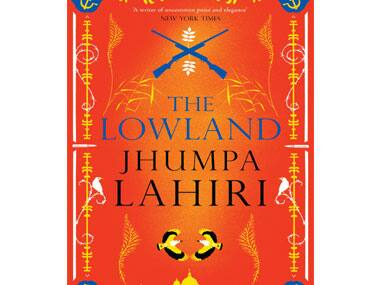New York: Jhumpa Lahiri’s The Lowland, a classic story of family and ideology at odds, is one of the most talked-about books of the busy US Fall publishing season, and is getting a hefty print run. Booksellers say the 352-page book to be released by American publishing powerhouse Knopf on September 24, is getting a nice pre-order bump by being long-listed for the 2013 Man Booker Prize. “A formidable and beautiful book. 350,000-copy announced first printing,” reported Publishers Weekly. [caption id=“attachment_1049161” align=“alignright” width=“380”]  Pultizer-prize winning author Jhumpa Lahiri’s sweeping new novel “The Lowland” is set in India and America. Picture courtesy Elena Seibert.[/caption] The Lowland is a riveting novel that spans more than four decades in the life of the bhadralok Mitra family. Set in both India and America, it’s a tale of two continents in a time of political tumult. Born just fifteen months apart, brothers Subhash and Udayan Mitra are exceptionally close and yet quite different. It is the 1960s, and firebrand Udayan gravitates towards the Naxalite movement, while more dutiful Subhash leaves Calcutta to go to America to earn his PhD in chemistry. Udayan also secretly marries independent and scholarly, Gauri. Lahiri brings things quickly to a boil when Subhash learns what happened to his brother in the lowland outside their family’s home. He goes back to India, hoping to pick up the pieces. Guari is the woman who links the brothers in unexpected ways. It would be unfair to reveal too much of the story, which spans four generations and two nations, but suffice to say that Lahiri explores the issues of love and loyalty with Subhash’s devotion to his brother forming the bedrock of the story and causing him more than a little heartache. The acclaimed chronicler of the Bengali-immigrant experience deftly moves her story across continents from Tollygunge in Calcutta to Rhode Island to California. There’s likely to be laser-like focus on how the Pulitzer Prize-winning author portrays the Naxalite movement. Don’t expect an Arundhati Roy-style political activist. Lahiri is cautious and circumspect about portraying the Maoist uprising as a solution to the problems faced by India’s poor. But the novel incisively explores the various layers of society in Calcutta, and the contrast that exists in that city, between extreme poverty and privilege. “As Udayan’s creator, I don’t condone what he does. On the other hand, I understand the frustration he feels, his sense of injustice, and his impulse to change society,” Lahiri told The New Yorker. She told the magazine that from the beginning she knew that her book would involve two brothers. “Tollygunge, the part of Calcutta where Subhash and Udayan grow up, is where my father grew up, and where I spent a lot of time during visits with my family. At some point — I may have been a teenager, or perhaps a bit older — I learned that two brothers, who had become involved in the Naxalite movement, had been killed in front of their parents and some other family members,” Lahiri told The New Yorker. [caption id=“attachment_1049163” align=“alignright” width=“380”]  The Lowland: Book cover[/caption] “It was a story my parents heard second-hand from relatives, and that I then heard third-hand from my parents. In other words, the facts and details were sketchy, but I knew that there had been two brothers, both very bright students, and that either one or both of them had hidden in a lowland when the paramilitary raided the neighborhood. I wanted to understand what had happened, and why, and that was what sparked the story. From the narrative standpoint I thought it would be interesting to have only one brother become involved politically, and I began to distinguish them as individuals,” she added. Lahiri is the author of three previous works of fiction: Interpreter of Maladies, The Namesake and, most recently, Unaccustomed Earth. The author, known to be reclusive, is getting a whole lot of attention and praise for her new novel. “Lahiri uses a gorgeously rendered Calcutta landscape…As shocking complexities, tragedies, and revelations multiply, Lahiri astutely examines the psychological nuances of conviction, guilt, grief, marriage, and parenthood, and delicately but firmly dissects the moral conundrums inherent in violent revolution,” said Booklist magazine. “Renowned for her exquisite prose and penetrating insights, Lahiri attains new heights of artistry — flawless transparency, immersive intimacy with characters and place — in her spellbinding fourth book. A magnificent, universal, and indelible work of literature…Lahiri’s standing increases with each book, and this is her most compelling yet,” it added.
Jhumpa Lahiri’s The Lowland, a classic story of family and ideology at odds, is one of the most talked-about books of the busy US Fall publishing season, and is getting a hefty print run.
Advertisement
End of Article


)
)
)
)
)
)
)
)
)



